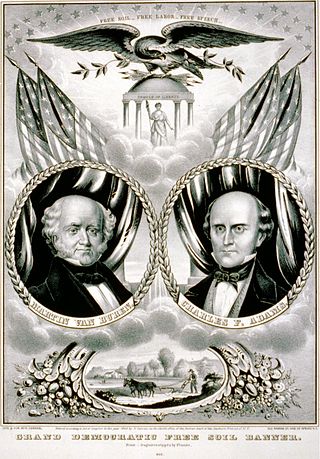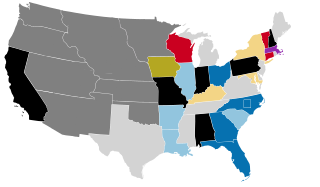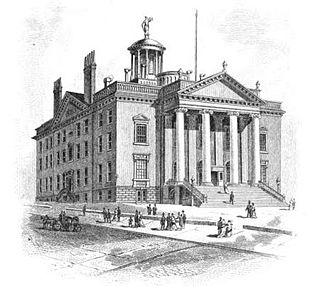
The Free Soil Party was a short-lived coalition political party in the United States active from 1848 to 1854, when it merged into the Republican Party. The party was largely focused on the single issue of opposing the expansion of slavery into the western territories of the United States.

Lyman Trumbull was an American lawyer, judge, and politician who represented the state of Illinois in the United States Senate from 1855 to 1873. As an ardent abolitionist and key political ally to Abraham Lincoln, and a leading legislator during the Civil War and Reconstruction, authoring the Confiscation Acts, which created the legal basis for the Emancipation Proclamation; Thirteenth Amendment to the United States Constitution, which abolished chattel slavery; and Civil Rights Act of 1866, which led to the Fourteenth Amendment to the United States Constitution.

The 34th United States Congress was a meeting of the legislative branch of the United States federal government, consisting of the United States Senate and the United States House of Representatives. It met in Washington, D.C., from March 4, 1855, to March 4, 1857, during the last two years of Franklin Pierce's presidency. The apportionment of seats in the House of Representatives was based on the 1850 United States census. The Whig Party, one of the two major parties of the era, had largely collapsed, although many former Whigs ran as Republicans or as members of the "Opposition Party." The Senate had a Democratic majority, and the House was controlled by a coalition of Representatives led by Nathaniel P. Banks, a member of the American Party.

The 1854–55 United States House of Representatives elections were held in 31 states for all 234 seats between August 4, 1854, and November 6, 1855, during President Franklin Pierce's term. Each state legislature separately set a date to elect representatives to the House of Representatives before the 34th Congress convened its first session on December 3, 1855.

The 1852–53 United States Senate elections were held on various dates in various states, coinciding with the 1852 presidential election. As these U.S. Senate elections were prior to the ratification of the Seventeenth Amendment in 1913, senators were chosen by state legislatures. Senators were elected over a wide range of time throughout 1852 and 1853, and a seat may have been filled months late or remained vacant due to legislative deadlock. In these elections, terms were up for the senators in Class 2.

The 1896–97 United States Senate elections were held on various dates in various states. As these U.S. Senate elections were prior to the ratification of the Seventeenth Amendment in 1913, senators were chosen by state legislatures. Senators were elected over a wide range of time throughout 1896 and 1897, and a seat may have been filled months late or remained vacant due to legislative deadlock. In these elections, terms were up for the senators in Class 3.

The 1856–57 United States Senate elections were held on various dates in various states. As these U.S. Senate elections were prior to the ratification of the Seventeenth Amendment in 1913, senators were chosen by state legislatures. Senators were elected over a wide range of time throughout 1856 and 1857, and a seat may have been filled months late or remained vacant due to legislative deadlock. In these elections, terms were up for the senators in Class 1.

The 1854–55 United States Senate elections were held on various dates in various states. As these U.S. Senate elections were prior to the ratification of the Seventeenth Amendment in 1913, senators were chosen by state legislatures. Senators were elected over a wide range of time throughout 1854 and 1855, and a seat may have been filled months late or remained vacant due to legislative deadlock. In these elections, terms were up for the senators in Class 3.

The 1884–85 United States Senate elections were held on various dates in various states, coinciding with the presidential election of 1884. As these U.S. Senate elections were prior to the ratification of the Seventeenth Amendment in 1913, senators were chosen by state legislatures. Senators were elected over a wide range of time throughout 1884 and 1885, and a seat may have been filled months late or remained vacant due to legislative deadlock. In these elections, terms were up for the senators in Class 3.

The 1830–31 United States Senate elections were held on various dates in various states. As these U.S. Senate elections were prior to the ratification of the Seventeenth Amendment in 1913, senators were chosen by state legislatures. Senators were elected over a wide range of time throughout 1830 and 1831, and a seat may have been filled months late or remained vacant due to legislative deadlock. In these elections, terms were up for the senators in Class 3.

The 78th New York State Legislature, consisting of the New York State Senate and the New York State Assembly, met from January 2 to April 14, 1855, during the first year of Myron H. Clark's governorship, in Albany.
The 1851 United States Senate election in Massachusetts was held during January 1851. Free Soil Party candidate Charles Sumner was elected by a coalition of Free-Soil and Democratic legislators over Whig incumbent Robert C. Winthrop, who had been appointed to finish the term of retiring Senator Daniel Webster.
The 1859 United States Senate election in Massachusetts was held during January 1859. Incumbent Senator Henry Wilson, who had been elected in 1855 to fill the unexpired term of Edward Everett, was re-elected easily to a full term as a member of the Republican Party.
The 1865 United States Senate election in Massachusetts was held during January 1865. Incumbent Republican Senator Henry Wilson was re-elected easily to a second term as a member of the Republican Party.
The 1871 United States Senate election in Massachusetts was held on January 17, 1871. Incumbent Republican Senator Henry Wilson was re-elected easily to a third term as a member of the Republican Party. Wilson would not finish the term, since he was elected Vice President of the United States in 1872.
The 1873 United States Senate special election in Massachusetts was held in March 1873 to fill the vacancy left by Senator Henry Wilson, who resigned to become Vice President of the United States. George S. Boutwell won the election.
The 1895 United States Senate election in Massachusetts was held in January 1895. Incumbent Republican Senator George Frisbie Hoar was re-elected to a fourth term in office.
The 1854 Massachusetts gubernatorial election was held on November 15. American Party candidate Henry J. Gardner was elected to his first term as governor, defeating incumbent Whig Governor Emory Washburn.
The 1853–54 Massachusetts gubernatorial election consisted of an initial popular held on November 14, 1853, which was followed by a legislative vote that was conducted on January 9, 1854, which elected Whig Party nominee Emory Washburn. The ultimate task of electing the governor had been placed before the Massachusetts General Court because no candidate received the majority of the vote required for a candidate to be elected through the popular election.
The 1850–51 Massachusetts gubernatorial election consisted of an initial popular held on November 11, 1850 that was followed by a legislative vote that was conducted on January 11, 1851. It saw the election of Democratic Party nominee Emory Washburn. The ultimate task of electing the governor had been placed before the Massachusetts General Court because no candidate received the majority of the vote required for a candidate to be elected through the popular election.











